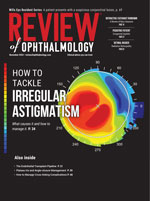What’s an eye worth? It may seem an odd question but, no matter your views on the specific vehicle of health-care reform and the decision of the Supreme Court, we have unquestionably entered the era when the need to justify your treatment decisions not just medically but economically is commonplace, at least in the part of medicine that relies on government reimbursement.
Last month, thousands of physicians in four midwestern states received the first “Quality and Use Resource Reports” from Medicare, showing the average amount their patients cost and the quality of care the physicians provided. They are for information purposes only at this point, and most experts say that there are miles to go before the mountains of kinks are worked out of a very complicated process. Though it will likely take several years, the process is under way. But the process is already having effects, some good, some not so much.
Also last month, a group called the Physicians Foundation released a survey based on interviews with 500 U.S. physicians, under age 40, about half primary care and the rest office- or hospital-based medical or surgical specialists. While 80 percent are either highly satisfied (35 percent) or somewhat satisfied (45 percent) with their current practice arrangement, and most expect to stay in that arrangement for at least eight years, their view of the future of U.S. health care is grim: 49 percent believe the impact of the Affordable Care Act on their practice will be negative; 23 percent believe it will be positive; 57 percent are pessimistic about the future of U.S. health care, 30 percent highly so. The reason? Most often, say the survey authors, is government involvement in health care.
It’s not news that physicians take a dim view of government in medicine, though these numbers are sobering. What is news, thankfully, is that when physicians and those involved in medicine proactively state their case, that case is often compelling.
Health Affairs received a fair amount of press this month when it published a study showing that, contrary to the conventional wisdom, at least one part of the U.S. health-care system, cancer treatment, is actually worth the higher prices paid for it here.
Consumer media also picked up and ran with the news of the American Board of Internal Medicine Foundation’s initiative to limit unnecessary testing in its nine subspecialty member groups.
Advamed, the medical device manufacturing industry group, has for years touted the efficacy of cataract surgery.
Getting these kinds of messages in front of government regulators is going to be more and more important in the next few years. That cost will be a factor in choosing medical treatment is an inevitable reality. It’s up to medicine to assure that value earned is also part of the equation.
 |



